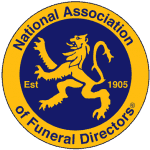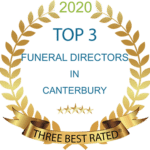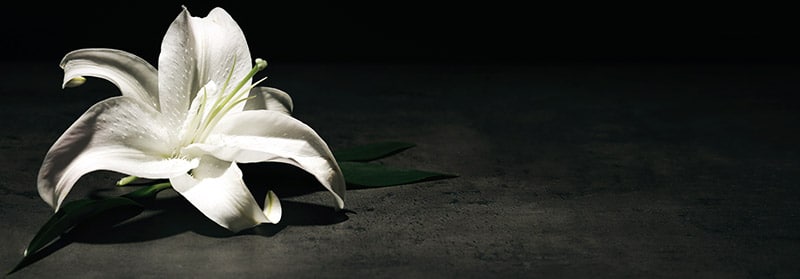
Introduction
Arranging a funeral can be an emotionally challenging experience and certain decisions will need to be made at a time when you’re least able to do so. We at A Welch and Sons Ltd are here to help and we’re just a telephone call away but, for those needing an answer to the many questions you may have, the notes on this page will help.
First Steps
When someone dies it is very common to get in touch with a funeral director. At A.Welch and Sons Ltd, we pride ourselves with the highest standard facilities, service, care and advice we provide to our customers over the last 70 years. From the first moment that you contact us, the telephone will be answered by someone who can give you assistance and advice, 24 hours a day: there are NO automated switchboards or endless departments to choose from.
Transfer of the Deceased
We will transfer the deceased to our private facilities in our own Private Ambulance. Our Ambulance is not sign-written in any way so provides a very discreet means of transfer at any time of the day or night.
We can also arrange for the deceased to be repatriated from within the UK or internationally.
Advice
We will advise you of all procedural and legal requirements relating to your own circumstances. This includes registration of the death, dealing with bank accounts, insurances, probate and estates. If there is ANYTHING you do not understand or need assistance with please ask us.
Arranging the Funeral Service
We will meet with you to arrange the funeral service and ensure that all the necessary paperwork is completed, collated and sent to the appropriate places. If you prefer we will visit you and your family at home at no extra charge. We will contact the funeral celebrant on your behalf, make the necessary arrangements with doctors and hospitals and make all the necessary reservations for the funeral service.
Private Chapels
We have 3 private viewing Chapels where you can visit your loved one. Visits are by appointment only but are arranged at your convenience and include evening and weekend visits.
Mortuary Facilities
Our mortuary facilities were completely refurbished in 2012. We have refrigerated storage facilities for the deceased. We also have a fully equipped Hygienic Treatment Theatre staffed by a fully qualified embalmer.
Memoria
We can provide Cards and Books of Remembrance for the funeral service.
We can provide a large range of Cremated Remains Memoria including:
- Solid Wood Caskets & Urns
- Metal, Stone, Crystal & Glass Urns
- Keepsake Jewellery
- Glass/Crystal Paperweights & Jewellery
- We will assist you in selecting and ordering Headstones and Grave Markers.
Everyone has different requirements and expectations of the funeral that they are arranging; every funeral is unique. Our list of services provides a broad overview of what we can provide but it is by no means exhaustive. Whatever you require please talk to us; if it is possible we will do it.
Registering a death
There are 3 things you must do in the first few days after someone dies.
- Get a medical certificate from a GP or hospital doctor. You’ll need this to register the death.Register the death within 5 days.
- You’ll then get the documents you need for the funeral.
- Arrange the funeral – you can use a funeral director or arrange it yourself.
Please note that if the death has been reported to a coroner you can’t register the death until the coroner gives permission.
When registering a death, you will be asked for the following information about the deceased:
- The date and place of death
- The full name and usual address (and maiden name if applicable)
- The date and place of birth
- The occupation (and name and occupation of her husband if applicable)
- Details of any pension or allowance from public funds
- The date and place of birth of any surviving spouse
- The full name and usual address of the Informant
- The qualification of the Informant
A Death Certificate can then be obtained on payment of the prescribed fee. This will be needed for obtaining Probate or letters of administration, closing bank accounts and making claims on insurance policies.
The Registrar will also issue a green Registrar’s Certificate for Burial or Cremation which will be needed by the Funeral Director, and a white Certificate of Registration of Death – Form 344/BD8 – which is for Social Security purposes to cancel the payment of pensions and allowances from public funds.
Without a Cause of Death the Registrar cannot allow the death to be registered.
The coroner
A doctor may report the death to a coroner if the:
- cause of death is unknown
- death was violent or unnatural
- death was sudden and unexplained
- person who died was not visited by a medical practitioner during their final illness
- medical certificate isn’t available
- person who died wasn’t seen by the doctor who signed the medical certificate within 14 days before death
- death occurred during an operation or before the person came out of anaesthetic
- medical certificate suggests the death may have been caused by an industrial disease or industrial poisoning
The coroner may decide that the cause of death is clear. In this case:
- The doctor signs a medical certificate.
- You take the medical certificate to the registrar.
- The coroner issues a certificate to the registrar stating a post-mortem isn’t needed.
If the coroner decides to hold an inquest
A coroner must hold an inquest if the cause of death is still unknown, or if the person:
- possibly died a violent or unnatural death
- died in prison or police custody
- You can’t register the death until after the inquest. The coroner is responsible for sending the relevant paperwork to the registrar.
The death can’t be registered until after the inquest, but the coroner can give you an interim death certificate to prove the person is dead. You can use this to let organisations know of the death and apply for probate. When the inquest is over the coroner will tell the registrar what to put in the register.
Cremation & burial
In the United Kingdom, when someone passes away, a burial or a cremation is usually performed.
Burial
A burial takes place at a cemetery. It can occur after a funeral service has been held in a church or other venue, and, sometimes, a service is held at the graveside.
During a burial, the remains of a loved one, along with the coffin or casket, are memorialised in a grave.
Cremation
When a cremation is chosen as the preferred type of funeral, A . Welch and Sons will arrange for the necessary forms to be completed by the nearest surviving relative.
A cremation takes place at a crematorium. It can occur after a funeral service has been held in a church or other venue. There are many options available with regards to the remains of your loved one which we will be happy to discuss with you in detail.
We can help you with all the necessary requirements for a cremation, including choosing the venue and taking care of all documentation and formalities.
Everyone has different requirements and expectations of the funeral that they are arranging; every funeral is unique. Our list of services provides a broad overview of what we can provide but it is by no means exhaustive. Whatever you require please talk to us; if it is possible we will do it.
Cemetery or churchyard?
In England and Wales, burial took place principally in churchyards until the 19th century. Concerns about hygiene in the mid-19th century resulted in many town and city churchyards being closed. This was followed by the development of larger joint-stock cemeteries and municipal cemeteries, often on urban fringes. These took on the larger proportion of burials. The term ‘burial grounds’ is often used to denote either, though it is also used to denote the burial place of a distinctive group, either by religion or national identity.
Cemetery Burial
Anyone can be buried in a Local Authority cemetery, which will sometimes be divided into sections for different faiths and those of no faith. Different religions and cultures have developed different rites and practices for the disposal of the dead, and these have to be considered and respected. There are a number of separate Jewish and Muslim cemeteries, for example, but there are also many cemeteries where different religions are given separate areas within the public cemetery.
Churchyard Burial
Burial in a Churchyard is open to all members of the parish who have been baptised
Compliance
As members of the National Association of Funeral Directors (NAFD), A. Welch and Sons Ltd agree to comply with the principles and the details of this Code of Practice.
Code of Practice Principles
Full document available at The Funeral Director Code – The NAFD
Members must:
- Act in the best interests of each client, and prospective client;
- Provide the best possible level of care to bereaved people, keeping in mind the specific needs of each client and family;
- Respect and maintain the dignity of deceased people in your care at all times;
- Act transparently, with honesty and integrity;
- Provide clients with full and fair information about services, products and associated prices;
- Behave in a way that promotes and maintains public trust in their business, the funeral directing profession, and related industries;
- Comply with all legal and regulatory obligations and deal with their regulators in an open, times, and cooperative manner;
- Run their business effectively and in accordance with proper governance and sound risk management principles;
- Run their business in a way that encourages equality of opportunity and respect for diversity;
- Run their business in a way that encourages a culture that values and welcomes both negative and positive feedback as a way of putting things right and continuously improving service; and
- Conduct appropriate due diligence in relation to all third-party contractual relationships that have the potential to negatively impact clients.
This Code of Practice and adherence here to is monitored by the National Association of Funeral Directors. You can contact the NAFD in writing to the following address:
NAFD LTD
618 Warwick Road
Solihull
West Midlands
B91 1AA
If you need further information or clarifications, please do not hesitate to contact us.



